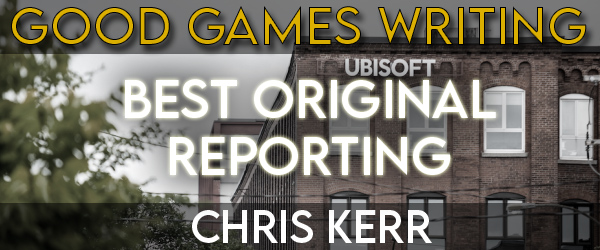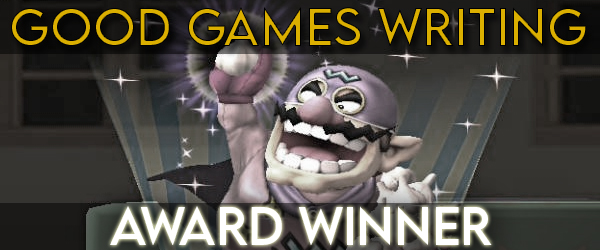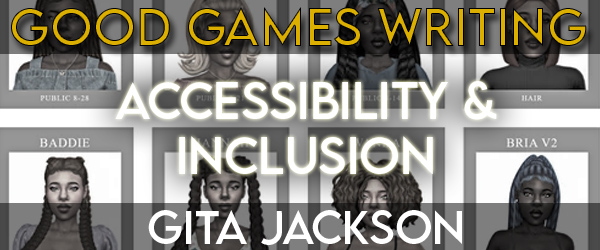It’s the second-last day of #TheGoodies2020 and we’re dropping two(ish) new awards!
ACCESSIBILITY & INCLUSION
This award represents works that make gaming a space for everyone.
It’s for pieces like Ben Sledge’s that highlight a visually impaired streamer’s approach to hunting shiny Pokémon.
Tony is partially sighted, so while he can see some shapes, he struggles to read the game’s text and make out colours – especially when a shiny Pokémon doesn’t look that different from its regular counterpart. […] So, he shiny hunts by sound. When a shiny Pokémon appears, it sparkles and glows. However, most players won’t notice that these sparkles also let out a unique noise. That’s what Tony is listening for, and that’s how he knows if he’s found a shiny Pokémon or not.
It’s for videos that call out publishers who hide their accessibility settings behind NPCs and progressions and for articles that celebrate the ways in which games–in this case Hades—bake accessibility into their design:
Think of how we see people play video games on TV: furiously mashing buttons on a tightly clenched controller for a few tense moments before YOU DIED appears on screen. By comparison, I can’t safely button mash (or hold a controller that tightly). But Hades has added weapons like Exagryph, the Adamant Rail, a rifle style weapon that satisfyingly rat-tat-tatts out shells with one long press of a button, or fires rockets with another. Unlocking it made a major difference to my ability to stay in the game.
Liana Ruppert’s “Epileptic PSA” on Cyberpunk 2077 was so influential the developers responded by releasing an update to address the issue. It’s unfortunate Ruppert had to suffer a major seizure to make such a difference but she did before the devs responded: She kept playing and turned her PSA into a mini-guide on what to watch out for and when.
At Can I Play That?, Courtney Craven’s PS5 review caught our attention for the detail in which it dives into the menus, controller, and system features.
At The Washington Post, Grant Stoner tackles accessibility consultants and their oft unseen work, especially focusing on the techniques that are intentionally invisible: turning on subtitles by default, reducing/removing button mashing sequences, and single-stick aiming are but a few examples.
Ben Bayliss builds on Stoner’s work, taking a deep dive into the accessibility work done in The Last of Us Part II, through interviews with the consulting team. It’s an article that does two things we appreciate: It highlights the specific people behind the work–people whose names we might otherwise think to ask about–and through their voices it reveals the systems and processes inherent in the game’s accessibility.
“I think the bar now has been raised for other development studios to follow the same example,“ Lane said. “Gaming should always be a challenging experience. However, it should never be a frustrating experience.“ He mentioned that there’s always a mutual determining factor whenever he has discussions with other disabled gamers. “That is that we never fully get to enjoy the gaming experience because of the anxiety of making sure that we are able to use every function of the controller, hear different cues, see everything on the screen, read descriptions, control characters or experiences. This list can go on for days. It shows the need to make sure the gaming is inclusive for all.
Over at Vice, Gita Jackson reports on The Sims 4’s black players and their campaign to see themselves in the game. Those players have had to heavily mod the game to get features that resemble their appearance including darker skin tones, improving the “ashy” appearance of the ones that exist as a result of a lack of undertones, and a limited selection of afro-textured hair.
Black Simmers have been asking for more and better skin tones since the game’s launch. The on and off campaign really took off when protests against police brutality in the United States took off in May. At the time, many corporations, including video game companies, made statements committing to better serve their black customers. Electronic Arts, the company that currently owns the Sims franchise, made such a statement, and so did the Sims development team. “The Sims is committed to creating the world as it should be, one that is kinder, more connected and built on representation and inclusion,” the The Sims‘s development team’s statement said.
ORIGINAL REPORTING
The award for Original Reporting is always competitive and always manages to exclude more people than we care to: There is a glut of great reporting out there that deserves recognition. A number of those pieces have been nominated in other categories and we hope you’ve engaged with them.
At Uppercut, Cian Maher traces the rise of the Polish indie scene in the wake of the runaway success of The Witcher 3. It’s a 40 year history that includes games like The Vanishing of Ethan Carter, This War of Mine, and, of course, Cyberpunk 2077 and now potentially hundreds of development studios in the small country.
Khee Hoon Chan also looks at a group of indies though this time it’s the challenges present for Chinese developers under the microscope. China in many ways feels late to the party surrounding video games–explained by Chan as a combination between the tumult of the ’70s and a cultural focus on studying in the teenage years. The intricacies of applying for a license to sell a game in China are detailed here in extraordinary detail and the need for Chinese studios to market to an international audience is laid bare.
Over at USGamer, Jeffrey Rousseau asks “Where Are Our Black Gaming Journalists?” The answer isn’t clear cut but the blend of analysis and use of interview subjects is illuminating. While unpacking the factors that lead to the absence of black journalists (both at large and in gaming generally) Rousseau points out there are many more black creators on places like Twitch.
“It’s no surprise that black talent is deciding that journalism is not for them or feel they won’t be welcome or the workplace will be difficult,” says Ramanan. “The talent is there, it just needs an opportunity. Editors have that power and so do staff writers who can bend the ear of the people hiring or taking pitches.”
Rousseau ends on what he describes as a somewhat pessimistic note, saying that the burden continues to be on black creators and journalists to make spaces. It shouldn’t be. Consider this a call to action.
The games industry more broadly has issues with opening itself up to more people: Jason Coles looks specifically at the obstacles working class people facing breaking into the industry while providing (via interview subjects) some ideas on how to overcome those roadblocks.
It is the Temtem player community that pushed Crema Games to be more inclusive in its language, reports Astrid Johnson at Gayming Mag. The challenge Crema Games faced was in creating more than the standard he/him and she/her pronouns in languages such as French which rely heavily on masculine/feminine constructs. The community responded in kind with ideas and suggestions.
Ash Parrish’s profile of Cynthia Harrell, the voice of the song “Snake Eater” from the Metal Gear game with the same subtitle, is both fascinating and touching. The relative obscurity of the performer, how she got her start singing, her relationship to Konami, and the games she plays are all tidbits we can’t get out of our minds.
Nicole Carpenter’s blistering reporting on the accusations of racism and sexism being commonplace at Cards Against Humanity involves interviews with nearly 30 former staffers, contractors, and people with knowledge of the operation. The piece plainly describes the game, the allegations, the working conditions in the writers’ room, and more. Updates are appended throughout–the story was evolving and interview subjects clarifying the information they provided–in a clear manner. It’s fantastic reporting. Here’s a brief excerpt:
Employees and friends who described having challenged Temkin on ideas — even minor ones — said they felt they were risking retaliation from the Cards Against Humanity co-founder, and in some cases, believed that they had been retaliated against. Oftentimes, these sources said, the retaliation was subtle. Four former employees and two colleagues said Temkin might stop speaking to the person who’d challenged him for days or weeks, or leave them out of decision-making meetings. Three former employees said he would yell at other employees, and that women on staff often spoke on Slack about the most private places to cry after these encounters with Temkin. Three former employees told Polygon that at least one woman on staff had a “safe word” with Temkin for when he got too hostile.

It’s unfortunate that our winner is also about allegations of abuse and misconduct, this time at Ubisoft, as Gamasutra reporter Chris Kerr outlines the numerous and significant allegations against high-ranking members of the company. The reporting cites more than a dozen sources detailing rampant [h]arassment, homophobia, sexism, racism, bullying, and manipulation”.
The allegations name creative director Jonathan Dumont, quest director Hugo Giard, associate producer Stephane Mehay, executive producer Marc-Alexis Cote, and others at the Canadian studios. Ubisoft’s other global locations aren’t spared from the allegations.
Another suggested there was “a complete and utter lack of support from HR, to say nothing of broken trust,” and claimed those working in HR would actively spread gossip and rumor. “There was no proper infrastructure for reporting, let alone dealing with cases of sexual assault, harassment, misconduct, or other abuse in the office,” they continued. “When critiqued about the lack of official support, they went as far as saying they didn’t have anything in place because that would ‘imply we needed it,’ and that it would reflect badly on them.”
Ubisoft’s denials, claims about “making tough decisions”, five point plan, and more are put in the line of fire by Kerr, who continues to press Ubisoft at every juncture.
Dumont’s behavior was an open secret, according to our sources. People complained about his combustive style, but management never offered a concrete solution beyond forcing him to apologize or telling him not to interact with the writing staff directly. Dumont might’ve been the perpetrator, but Ubisoft management were complicit.
The “mafia-like” culture of “fear and oppression” at Ubisoft is a black-mark on the developer, its management, and its releases. One can hope Kerr’s reporting has made a difference.



